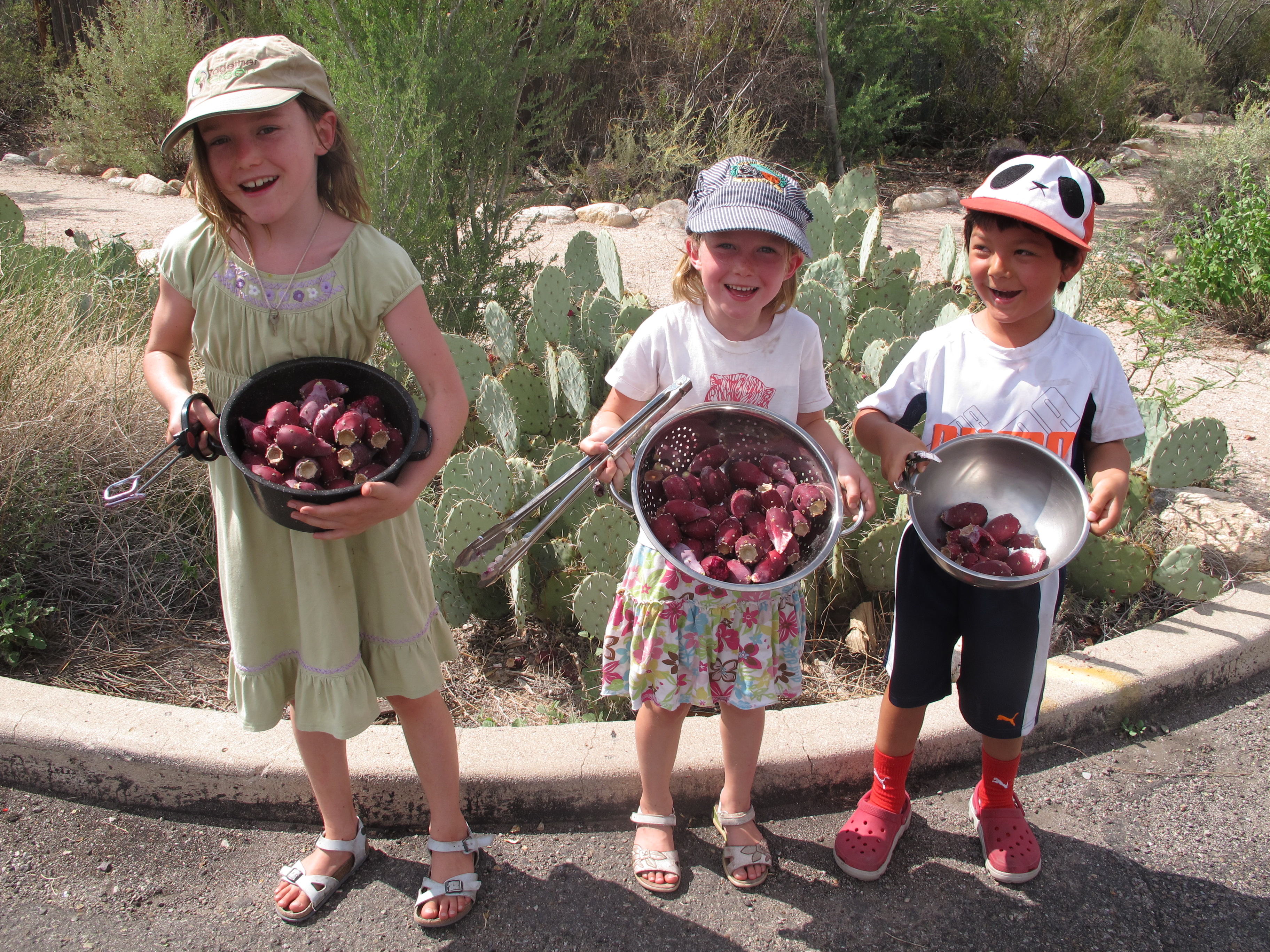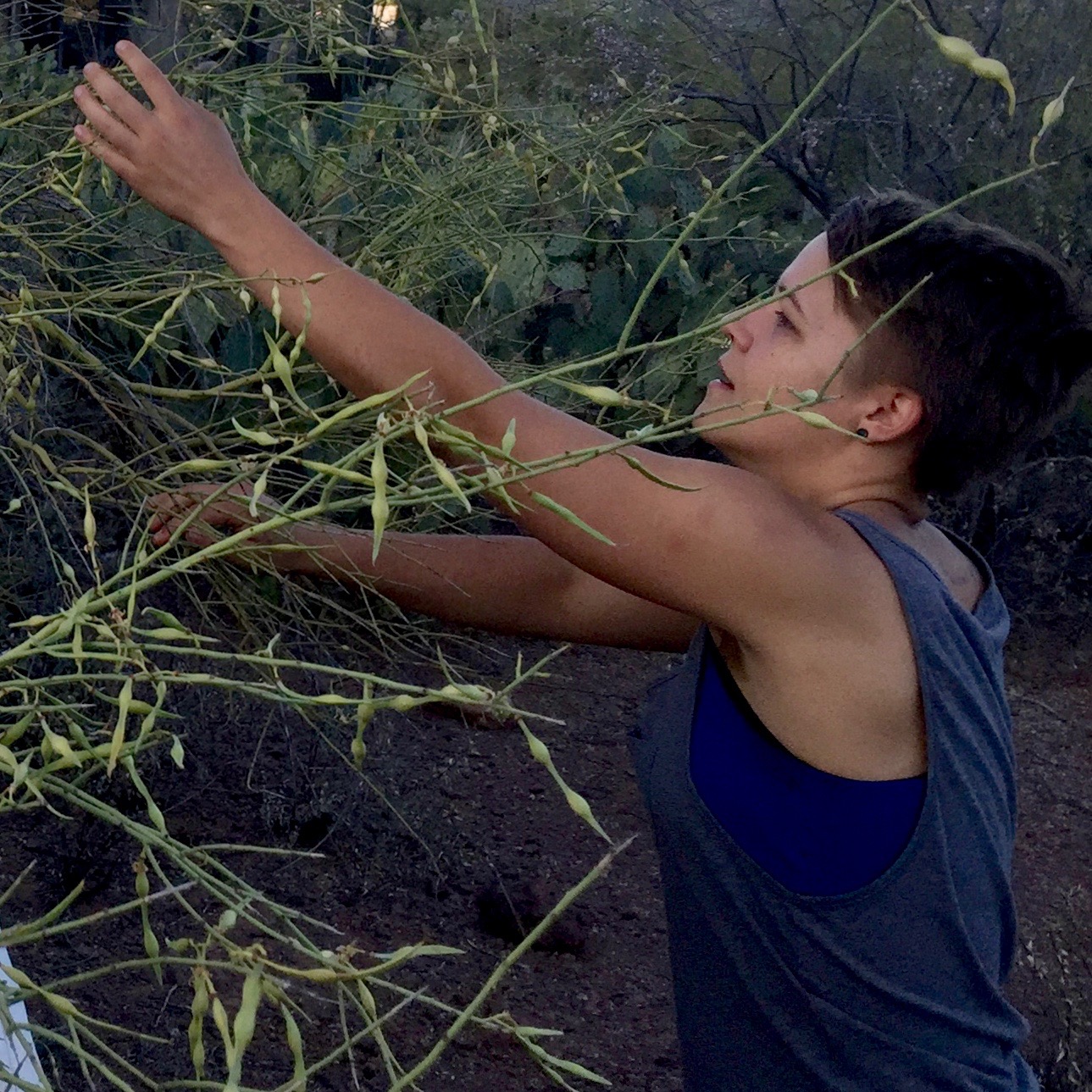
ABOUT USDesert Harvesters (DH) is based in Tucson, Arizona, in the beautiful, unique Sonoran Desert. For over twenty years Desert Harvesters has supported and grown community food and water security by inspiring the “re-wilding” of urban and suburban neighborhoods with delicious, drought-hardy, super-nutritious desert food plants, and cooking up affordable, place-based recipes anyone can create in their kitchen: A Grass-Roots Gastronomy! |
About: the Art and Craft of Place-Based Living! |
Desert Harvesters' roots are in Permaculture design and practice, and its heart is in food and economic justice, hands-on home-making, fairness and diversity. Sonoran Desert Food Forests in the wild grow and thrive on rainwater from winter and summer rainy seasons. In urban and other areas where native plants have been removed, replaced, and undervalued, desert food forests can be restored by planting within or beside rainwater-harvesting earthworks around your home, in community gardens, at local business properties, schools, and along street rights-of-ways. Once established, these plantings can thrive and produce nutritious and delicious food solely on rainfall and runoff from roofs, paths and other hard surfaces. Right: Neighborhood children in Dunbar Spring pick prickly pear fruit in street-side rain garden, a basin-shaped planting area irrigated by storm-water run-off. Desert Harvesters' work has inspired the city of Tucson to adopt storm water-friendly ordinances. |  |
| Desert Harvesters encourages you--desert dwellers and especially newcomers--to learn about Sonoran Desert native plants, the long and rich history of indigenous people and the food cultures they developed that inform current use, and how to plant, harvest, process and enjoy desert foods. Desert Harvesters works to share skills of "re-wilding" urban and suburban neighborhoods because it makes sense on so many levels to produce delicious, nutritious, drought-hardy foods, to create and sustain beautiful place-based landscapes, to nurturing resilient, food and water-secure communities. Left: Aspen harvests green palo verde beans from foothills palo verde. Harvested, blanched, and shelled, green palo verde beans are tender and very sweet, like garden peas. Desert foods are abundant, accessible, amazing super-foods! |
Desert Harvesters Manifeasto
Nature is a system of abundance, cycles, and efficiency.
We can mimic that.
Increase the fecundity of plants and their companions.
Leave and invest fallen pods, leaves, and cut-up prunings
as fertile mulch for animals, soil life, and trees.
Say “thank you” for your harvest with generous actions.
Turn landscapes into lifescapes and lushscapes.
Give back. REINVEST.
We live in a land of precious water.
Use local, free, and gravity-fed water—rather than
imported, costly, and mechanically pumped waters.
Therefore PLANT THE RAIN.
Capture rainwater by digging basins and other earthworks.
Catch rainwater runoff from roofs.
Divert public street run-off into public right-of-way
rain gardens.
When you grow and harvest rain-irrigated desert food, you
ENHANCE our local ecosystem.
HARVEST nearby.
Look for wild native-food sources in your backyard,
rights-of-ways, and urban trails.
If they don’t exist there, PLANT them.
Leave desert abundance where it belongs—in the desert.
Re-wild the urban and suburban core.
Delight your tastebuds.
Be a culinary cupid. Introduce new flavors to one another.
Find new combinations of traditional, wild foods. INNOVATE.
Prickly pear borscht, anyone? Mesquite muesli?
Practice place-based, place-appropriate,
place-inspired fusion.
Be here now. CELEBRATE.
Give thanks to the ancestors.
Make offerings for the future.
Contribute to food, fertility, and water security, here, now,
and for your children, their children, and their children.
Expand your COMMUNITY.
Meet your fellow desert dwellers.
Those that have roots and flowers.
Those that crawl and flutter.
Get to know other humans who harvest.
There is so much to observe, so much to love.
Invite. Involve. Include.
Abundant thanks to Kimi Eisele, word-weaver extraordinaire "Manifeasto" appears in Eat Mesquite and More: A Cookbook for Sonoran Desert Foods and Living
History
Planting Sonoran Desert Food Forests and growing community resilience since 1996
Desert Harvesters began in the late 1990's in various Tucson neighborhoods including Dunbar/Spring (dunbarspring.org), a historic African-American neighborhood, with activities like rainwater harvesting work parties, native tree-planting events, and info and food-sharing feasts. Since then, thousands of native perennial trees like velvet mesquite, foothills palo verde, and ironwood have been planted, providing food, shade and cooling, and many other benefits. Desert Harvesters' team has consulted for and assisted other neighborhoods to replicate this restorative and regenerative food forest model. Shaping landscapes to capture precious but limited rainwater with features like basins and swales transforms large volumes of storm water from a flood problem into a free, abundant, and sustainable irrigation resource.
In 2003 Desert Harvesters (DH) received a PRO-Neighborhoods grant to purchase a Meadows (www.meadowsmills.com) hammer mill. The mill quickly grinds dry mesquite pods into flour, providing people with a fresh and nutritious local food. The mill is mounted on a trailer so it can travel to various milling events around southern Arizona. The trailer is equipped with secure containers for all milling tools and equipment.
In 2011 Eat Mesquite: A Cookbook, was produced by DH volunteers, featuring mostly mesquite recipes tested and chosen by the community, plus a few stories and cultural information. Eat Mesquite: A Cookbook is no longer in print.
In 2017, a generous grant from LUSH Foundation funded the production of Eat Mesquite and More: A Cookbook for Sonoran Desert Foods and Living, featuring 17 different desert foods, 178 unique community-contributed recipes, interesting stories, a harvest calendar, and guides for desert living. This greatly expanded resource increased awareness of Desert Harvesters work in the community, and the cookbook received multiple awards.
in 2012, DH team members were hired to produce hands-on demonstrations and tastings at Community Food Bank's Santa Cruz River Farmers Market, with a focus on native Sonoran Desert foods plants that provide food security and nutrition, and can be easily grown in back yards, neighborhoods, schools, rights-of-way, and other property commons like city and county parks. These demos and tastings featured seasonal ingredients from Sonoran Desert bean trees (desert ironwood, palo verde, mesquite), berries (hackberry, wolfberry, chiltepin), cactus (barrel, cholla, saguaro, prickly pear, pincushion), greens, herbs, flowers, and medicinal shrubs and annuals. Hundreds of people have attended this market over the years, many who are demo regulars excited to try the innovative desert food samples DH offers.
These demos and additional Pima County Public Library presentations continued into early spring 2020, when Covid-19 safety guidelines went into effect. This hiatus has enabled DH to review its past 20 years and clarify its purpose and path forward.
Visit the navigation pages to see where DH is going into the future!
As we continue to build the website we’d like to include stories from the many volunteers and supporters who have contributed so much to our community. Contact us!
Reminder
DH cannot respond to individual requests, answer questions, or provide free consultations by phone or email. We hope that the updated website will address and answer many of your burning questions! (Coming soon: link to FAM- frequently asked mesquestions!)
DH also does not accept donations of ripe mesquite pods, provide harvesting services, or sell trees or ripe pods; however, that may change as NEON (Neighborhood Empowerment and Outreach Network) launches with opportunities to connect local producers and suppliers—stay tuned!

